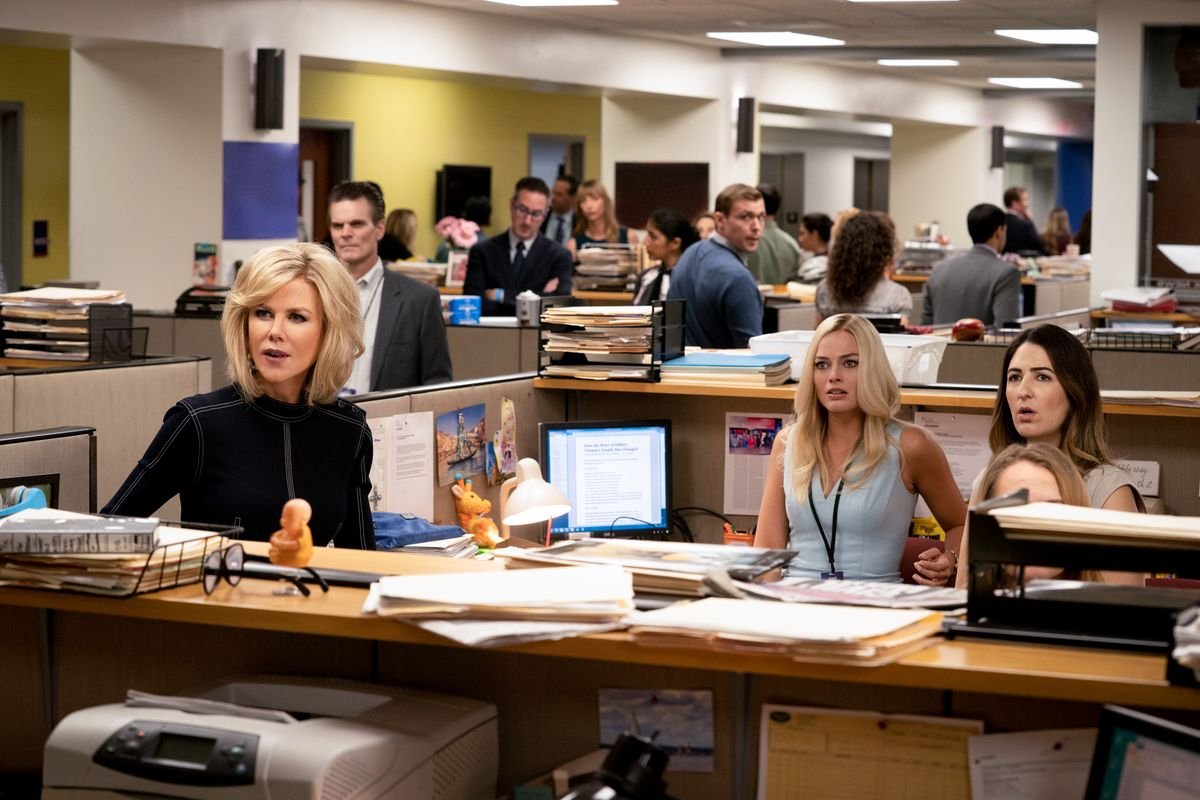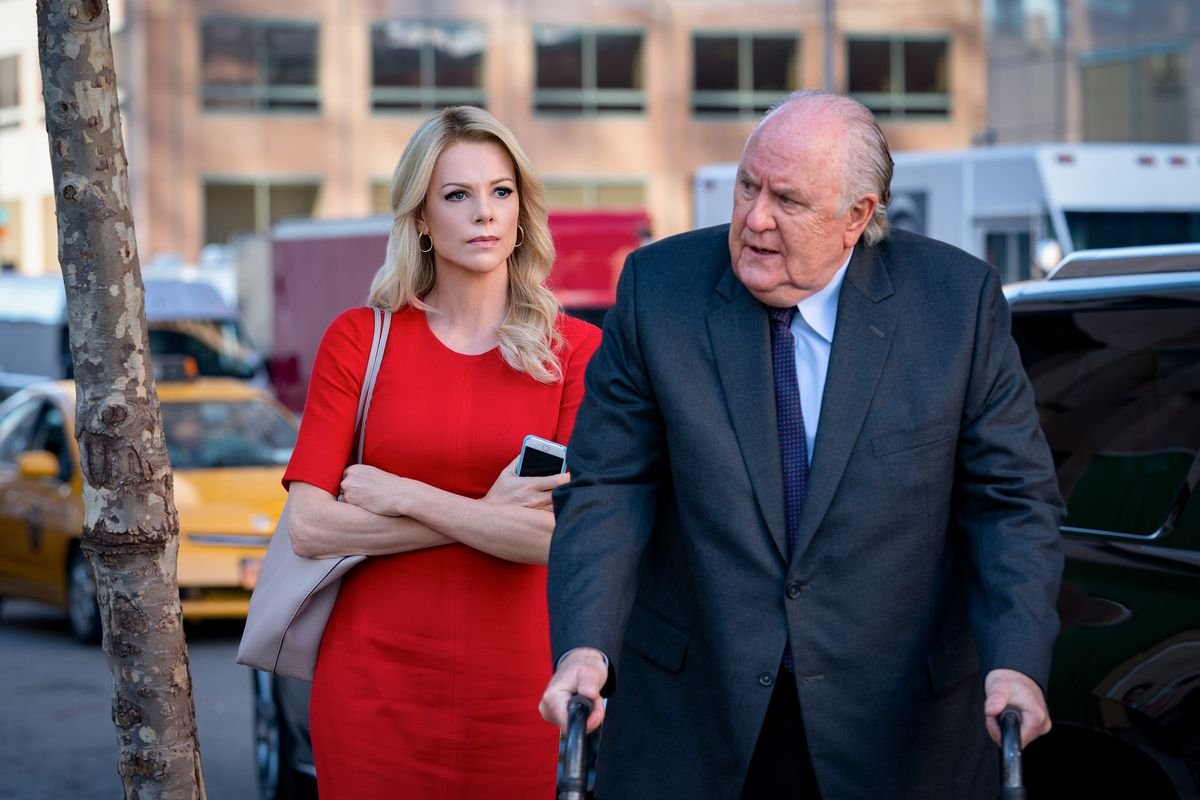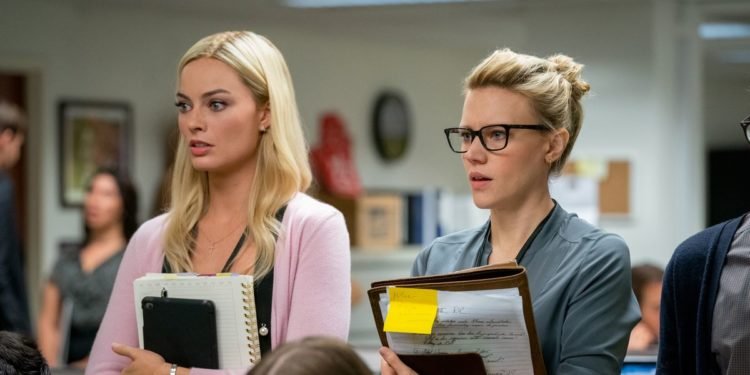Early in Bombshell, a new docudrama about sexual harassment at the Fox News cable channel, anchor Megyn Kelly (Charlize Theron) breaks the fourth wall. With impeccable, appropriate TV-presenter style, she gives the audience a tour of Fox News headquarters. Though she doesn’t exactly tip her hand about the network’s propaganda machine, she delivers exposition and asides with a knowing smile. Later in the film, fictional new recruit Kayla (Margot Robbie) gets the lay of the land from Jess, a fellow reporter played by Kate McKinnon, the woman who impersonates roughly half of Washington DC on the current iteration of Saturday Night Live. Jess, a closeted lesbian and closeted Democrat, tells Kayla that a great Fox story is something that will terrify her grandmother or enrage her grandfather. Zing!
This media-savvy, self-aware treatment of nearly-current events might feel familiar. So might Bombshell’s behind-the-scenes bona fides. Its director, Jay Roach, has worked extensively in comedy, on films like Dinner for Schmucks and Meet the Parents. Bombshell’s impressive cast features an all-star ensemble, including a roster of high-profile supporting players. The screenplay credit brings it home: The movie was written by Charles Randolph, who shared an Oscar win with Adam McKay for The Big Short. Like that movie and McKay’s follow-up Vice, Bombshell is an attempt to retell recent history with big stars, irreverent energy, and a healthy dose of message-movie righteousness — something fresher and more fired-up than the staid historical dramas of yore.

It wouldn’t be precisely fair to call Roach an Adam McKay imitator. Roach has been directing comedies longer (he made three Austin Powers movies before McKay directed a single Anchorman), and he’s been making political movies longer, too: He directed Recount and Game Change, about the 2000 and 2008 presidential elections, respectively, for HBO, though those movies weren’t exactly comedies. They focused more on fusing the immediacy and snap of good reporting with the hammier pleasures of good famous-people acting.
For that matter, Bombshell isn’t a comedy either. But for a while, it presents as one. It takes it as a given that Fox News culture is fairly ridiculous, but it doesn’t directly critique it. Even Kelly’s incidents of open racism (e.g., insisting that Santa Claus is white) are given a lightly deadpan treatment rather than presented with genuine condemnation. The film is ultimately more concerned with expressing that the women who work at Fox are still human beings, deserving of better treatment than the dismissiveness, lechery, and coercion they received.
The story follows three characters in various stages of dealing with Fox’s harassment culture. Gretchen Carlson (Nicole Kidman), recently fired, takes legal action. Megyn Kelly (Theron), embroiled in nasty insults from then-candidate Trump and his fans, mulls over whether to join her. And Kayla experiences the horrors of harassment straight from the head office, at the hands of Roger Ailes (John Lithgow).
Bombshell succeeds in replicating that HBO docudramedy snappiness — that is, it feels snappy, even though the dialogue isn’t especially smart, the pace isn’t especially hurried, and the story construction isn’t especially satisfying. But thanks to its three leads, it has some star-powered electricity. Theron does an uncanny impersonation of Kelly, projecting a hard-nosed veneer that makes her feel like she might keep charging forward, rather than bringing up incidents of harassment in her past with Ailes. Robbie is solid, too, as the compartmentalizing ingénue who goes through a harrowing (though predictable) process of disillusionment.
But eventually, all the famous faces shuffling across the screen — Alice Eve, Jennifer Morrison, D’Arcy Carden, Allison Janney, Connie Britton, Mark Duplass, Stephen Root, and Malcolm McDowell blur the line between character parts and bit players — start to feel like they’re part of a three-card Monte game. Some have taken Bombshell to task for valorizing Fox News women who did their part to spread lies and hate. That’s a fair critique, but the real problem is that the movie doesn’t have much of a point of view on anything, apart from the fact that harassment is bad.

Apart from some compelling procedural elements, the movie is mostly style, and that style is a generic mess of tics: pseudo-documentary quick zooms, exchanges of fraught glances, and handheld camera work. In short, it’s the style of The Big Short, which also imitates comedy more than actually performing it, taking the tone of satire without the wit. Though McKay’s broader movies with Will Ferrell are expertly executed and cleverly satirical, it’s his Oscar-winning work on Big Short that’s become a go-to mode for directors trying to grapple with contemporary issue movies. Steven Soderbergh’s Panama Papers dramedy The Laundromat, which arrived on Netflix earlier in 2019, takes a similar approach: semi-procedural, packed with celebrities, often breaking the fourth wall, as if the absurdities and outrage can’t be contained by mere conventional narrative.
It’s understandable that filmmakers are taking the fast-paced, light-hearted comic approach to history, especially in 2019. The last couple of decades have seen all kinds of movies trying to tackle current events or recent history with a traditional gravity, and failing to find an audience or make an impact. Think of the litany of Iraq War dramas (like Stop-Loss, Rendition, or Green Zone) that went nowhere with critics, audiences, or awards groups. News and culture both move far too quickly for the old issue-movie ways to feel like an effective solution, and this problem isn’t going away any time soon. Movies like Bombshell, The Laundromat, and Vice feel like they’re practicing for the inevitable day when directors may take it upon themselves to chronicle the Trump era, which defies easy biopic or docudrama conventions.
Even this new way of handling historical movies may not be an easy fix for that problem. The parade of grotesque caricatures in Trump’s administration has so stymied Saturday Night Live that the show can only throw McKinnon at whatever impressions she’s willing to take on. Bombshell itself plays a little like an SNL political cold open with even the weak laugh lines edited out, not least because Roach drops his own stylistic devices so carelessly. After the first half-hour or so, Theron doesn’t address the camera directly again, leaving the audience hanging: What was that engaging but isolated passage even for?
And Kelly remains an opaque figure. Her horrible treatment from Trump and his followers mirrors the horrible treatment she receives from her superiors, but none of the abuse ever seems to inspire any self-awareness, or self-reflection about the toxicity she’s enabled. The opportunity for her to explain herself, even or especially if it involves some self-deception, is simply dropped. It turns out the fourth-wall break was just an attention-grabbing device, like Margot Robbie in the bathtub explaining complicated financial terms in The Big Short.
Not every Big Short imitation in Bombshell feels quite so superficial. The Laundromat isn’t anywhere near one of Soderbergh’s best movies, but it’s committed to creating an antsy panorama of people affected by shady banking practices, and Soderbergh uses his fourth-wall breaks strategically, though not always effectively. (Its final scene, featuring Meryl Streep discussing the film’s messages to the camera, remains particularly divisive.)
But so far, this faux-freewheeling approach to contemporary history has produced good moments, rather than great movies. There’s a lot of authentic humor in the cheeky fake credits sequence that rolls midway through Vice, or the horrific boating accident that kickstarts The Laundromat’s investigation of shell companies. But while this post-comedy version of history is as grabby as a cleverly worded tweet, it’s ultimately just as easy to scroll past.
Bombshell arrives in theaters on December 20.
























































